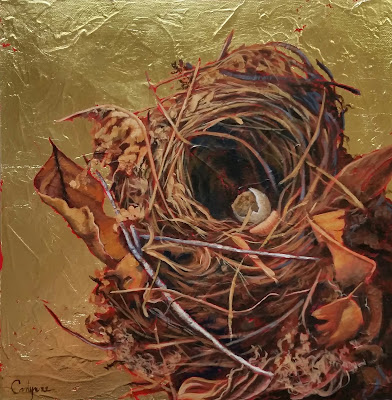Every once in a while a couple of topics come up when I'm working with art students.
1. They want it now! They want to be able to paint like an "expert" right off the bat. Practicing takes too long. They get frustrated. Some don't want to work on drawing skills but jump straight to the palette and paint. Let's get some color on that canvas. Some even want to finish that painting in the first class! We do live in an instant gratification culture.
2. When they produce something they're not that proud of they want to throw it away. Rip it up! Trash it. There's no point in keeping something they're never going to frame. It's not good enough to keep around. They say to me.... "you're a professional, I'm sure everything you do is worthy of framing". HA! They haven't seen the pile of canvases waiting to be painted over and the papers tucked away in folders that won't see the light of day.
I certainly understand the frustration! Been there, done that. Many times I've been frustrated with myself and my work. Just this week I spent 2 days really struggling with a new painting. At one point I wanted to gesso over the thing and start over. I have to keep reminding myself that every painting goes through an ugly stage and you shouldn't give up on it too soon. Keep working and most times you can get through that stage to the finish and even be satisfied (almost) with the result.
When discussions like this come up I like to pull out my old portfolio from art school. Mind you that was eons ago - 1970's - and yes, I still have a lot of that old work. I even have a piece from high school in that stash. It's the first scratchboard piece I did and the first piece of work that earned some cash. My friend Sue also did a black and white piece so we got together and had note cards printed. We packaged 3 of each design for a 6 card pack with envelopes and sold them around school and church.
Anyway, sometimes we all need to be reminded that things don't happen overnight. We all start somewhere. We're all beginners at something. No one picks up a guitar for the first time and plays like Eric Clapton. No matter what you're doing, it takes practice. There are no shortcuts to that part. Now it's usually in this part of the discussion where the word "talent" comes in but that's a topic for another time.
Right now we need to be more patient with ourselves. We need to focus more on the process than on the outcome. Every drawing that fails, every painting that's not "good enough" is still teaching us something. That teaching goes on for a lifetime! Every painting we do is a lesson in something whether it's a new color mix or a lesson in what doesn't work and we know not to do that next time. Be open to those lessons.
Don't throw out old work.
 This is one of the first colored pencil drawings I did when I was attending the Art Institute and studying fashion illustration. Yikes!
This is a colored pencil portrait I did last year.
I sure understand the temptation to throw away artwork. When I get these old pieces out and look at them I cringe. I want to go back into it and fix everything! But when looking at the old work and comparing it to the newer work I can see where I've been, how far I've come, how much I've learned, how much I've advanced in my skills.
Save your stuff! When you feel like you're not getting very far and are frustrated with what you're doing you can look back and realize- hey, I am getting better. That realization is one of the best motivators and will keep you practicing.
Give yourself a break. Keep drawing and painting. Save your work and nothing can replace the time you spend doing the work. Practice- daily if you can. There's no substitute for it and don't worry about it being frame worthy. It doesn't matter. What matters is the doing.
|














